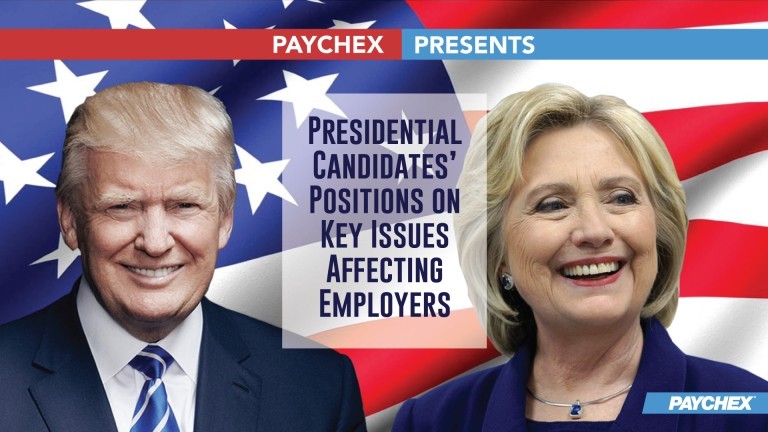Countdown to Election Day: Paychex Identifies Top Regulatory Issues Impacting Small Businesses

The outcome of the 2016 presidential election will impact small businesses across the U.S. With each candidate outlining a variety of views on issues affecting employers, and only a few weeks left until Election Day, Paychex, Inc., a leading provider of integrated human capital management solutions for payroll, HR, retirement, and insurance services, has identified the top regulatory issues impacting small businesses.
“Although the economy tends to rank as the leading election motivator for small businesses, business owners should be considering the candidates’ positions on a number of topics before casting their votes in November,” said Martin Mucci, Paychex president and CEO. “We’ve developed a series of materials to inform small business owners about important policy issues, and where the candidates stand on each, so they can make the most informed decisions possible.”
According to Paychex, the top regulatory issues are:
- Tax Reform: Both Republican candidate Donald Trump and Democratic nominee Hillary Clinton have made tax reform a key issue in their respective campaign platforms. Among the many tax-related proposals outlined by each, Trump has said that he will reduce the number of individual tax brackets and lower the business tax rate to 15% for those that retain profits within their business. Clinton supports the “Buffett Rule,” which aims to generate revenue from higher-income tax payers, ensuring those making more than $1 million pay at least 30 percent of their adjusted gross income in taxes. She would also establish a tax credit for businesses that hire and train apprentices and would encourage long-term investing by raising the capital gains tax.
- Employment Law: Regardless of who wins the 2016 presidential race, businesses can expect changes to employee pay laws. Both Clinton and Trump have been vocal about where they stand on key employee pay issues, including minimum wage, pay equity, and paid leave policies that, if implemented, would impact businesses, regardless of size.
- Health Care Reform: Another key issue at play this election is the future of the Affordable Care Act (ACA) or Obamacare. If elected, Trump has said he will repeal the ACA and allow health insurance companies to sell policies across state lines. Clinton, a proponent of the ACA, has said she would introduce changes to the law, intended to lower the cost of insurance premiums.
- Retirement: Although traditionally a hot election year topic, retirement security is an issue that’s flown largely below the radar this election cycle, with the exception of discussion on the topic of Social Security. When it comes to Social Security, Clinton has said she’ll expand the program by increasing taxes on higher earners. Trump has said he’ll preserve Social Security by reducing fraud and waste. In addition to this, small businesses should be monitoring a number of retirement issues, including workplace retirement plans and the increase in state-level workplace retirement program mandates.
- Immigration Reform: Immigration reform remains an issue of great significance to America’s small business owners. Trump has outlined a plan to stop the flow of illegal immigrants crossing the U.S. border. Clinton, meanwhile, has said she would provide a path to citizenship to undocumented workers in the U.S. and she supports the expansion of the H-1B visa program.
To learn more about these issues, and the candidates’ positions, visit www.paychex.com/worx/. As part of Paychex’s coverage of these election issues, you’ll find articles and videos exploring each of the topics.
Note: The foregoing is provided for informational purposes only, and is not intended to be tax or legal advice. Consult your licensed attorney, accountant, or other tax professional to discuss your particular facts, circumstances, and how these opportunities might apply to your business.